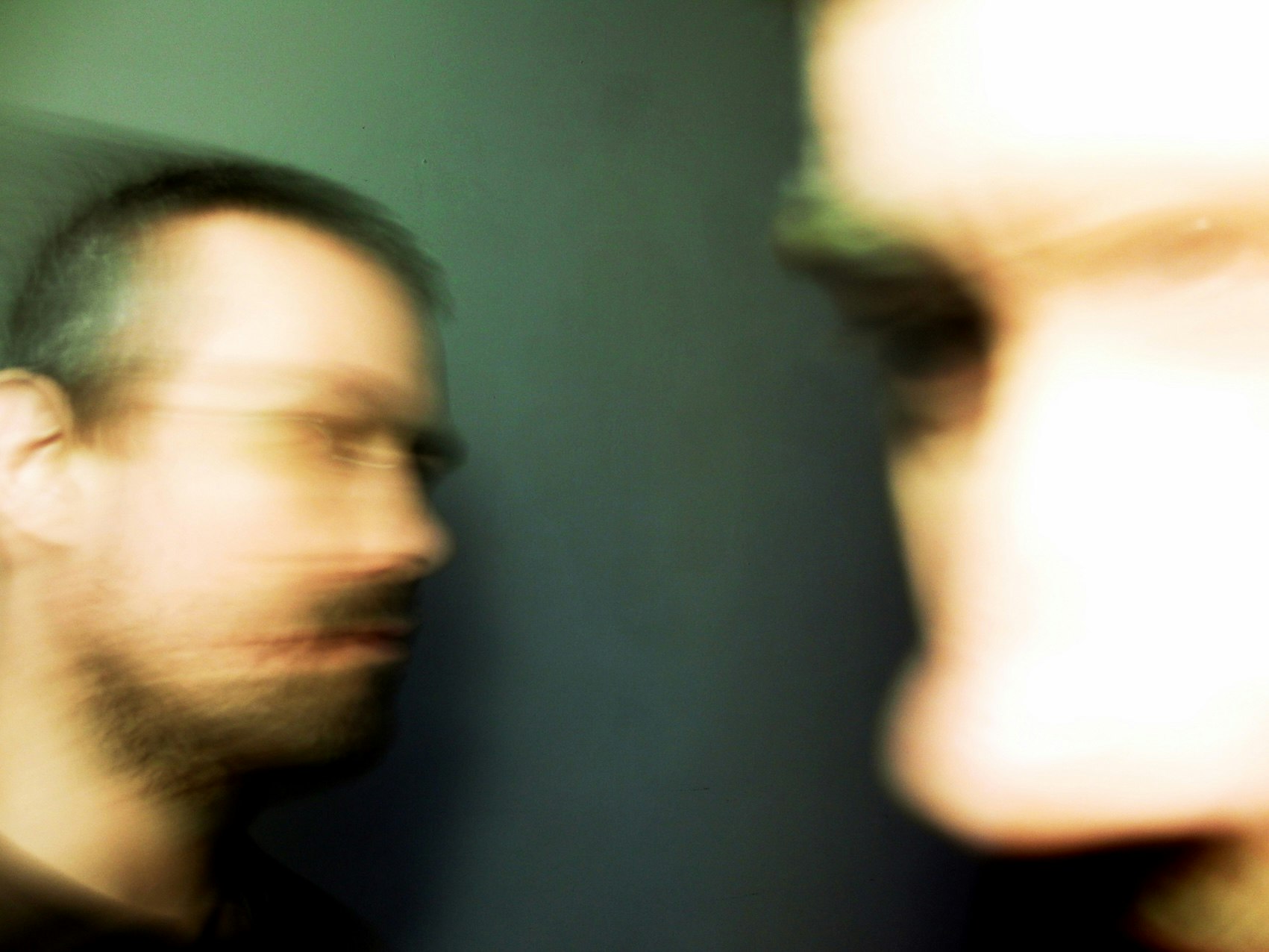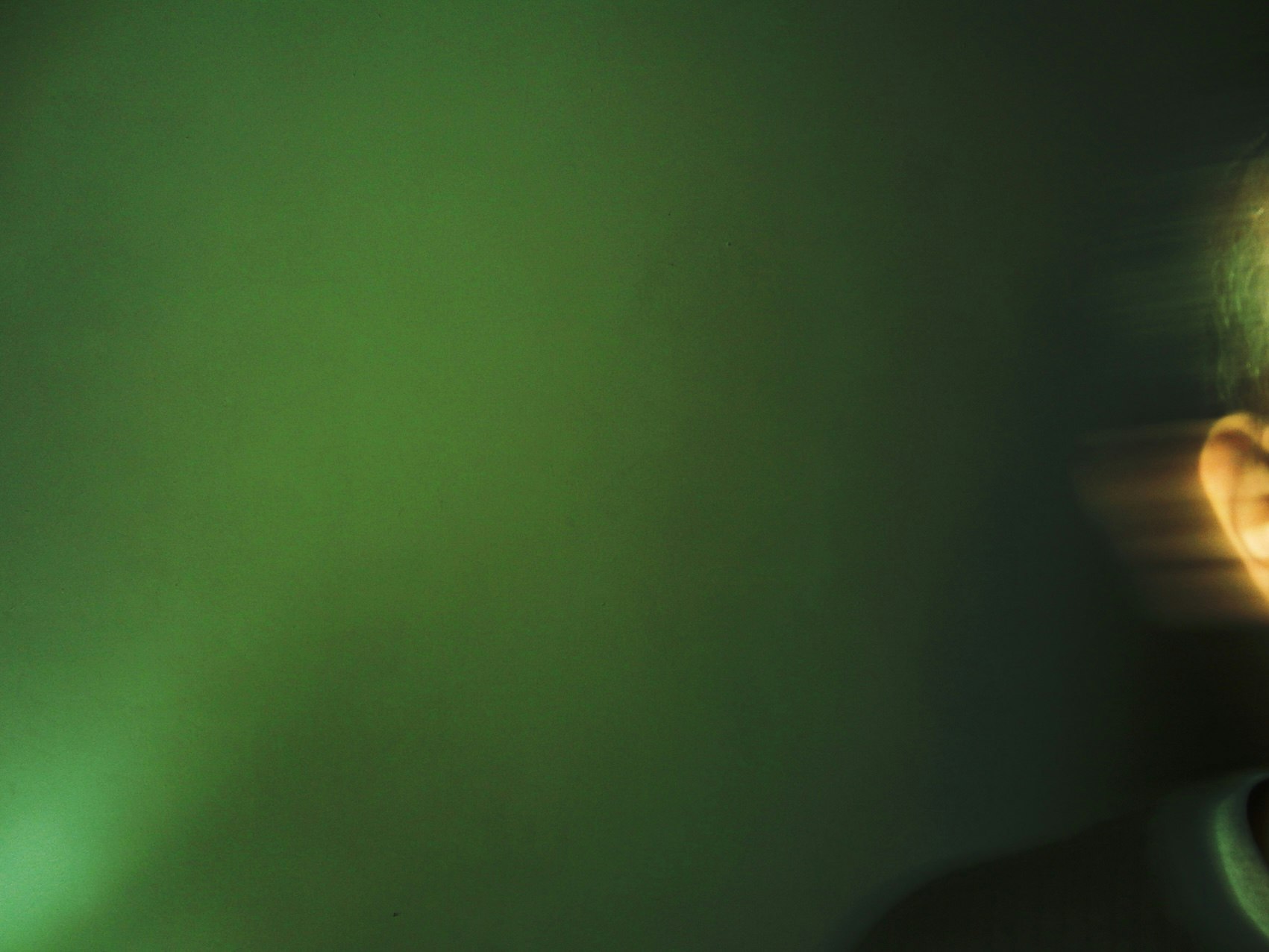Autechre - On Oversteps and Being Pigeonholed
Clash Magazine
Autechre talk Oversteps
Autechre - On Oversteps and Being Pigeonholed

Autechre
Originally published in Clash Magazine
March 2010
Words by Matthew Bennett
Everyone loves to wank. Let’s not lie. But for observers of electronic music there are few moister prospects than Autechre to musically jack off to.
Sean Booth and Rob Brown are often cited as the most highbrow boffins in electronic music, yet they look like they’ve just walked off the estates of Rochdale. Gruff stuff.
As veteran graffiti fiends and taggers, their love of iconography makes their song names such as ‘SonDEre-ix’ or ‘The PlclCpC’ share the menace of potent biological weapons, whilst their beats, rhythms and structures mutate through unclassifiable strains of ambient to hardcore and everything in between.
The sect of fanaticism that follows them around is mainly populated by rave-gaunt and slightly hairy men existing online, feeding on opinions. This has haemorrhaged a peculiar new trend in music: forgery. Just before their new album, ‘Oversteps’, was released a series of fake versions started appearing on the blogs and forums pretending to be the real thing.
Despite being production obsessive and spending a year making their latest album, they were surprisingly nonchalant: “Well, we’re used to it now,” breezes Sean. “I think this is the fourth album where it’s happened, the first one was ‘Draft’. It’s becoming a bit of a tradition now.” Rob continues: “It’s like the emperor’s new clothes because they can never tell what it’s going to be but they’re always guessing what it can be from their own personal perspectives.”
“We don’t know why we do what we do or why we like it.”
These fakes open up a great subjective debate over what Autechre should sound like. Since 1991 they’ve sailed from hardcore then ambient to the most unrestrained and fucked up music we’ve heard. But it’s easy to appreciate why such a cult surrounds them since modern musos mention them in the same breath as canonical and experimental composers such as Xenakis, a Greek theorist from the ’50s who, amongst many other attempts, aimed to reconfigure harmony. Autechre have cited him as an influence, or at least an interest - but is such name checking still valid or are these just the ghosts that writers chase through each others’ features?
Sean responds: “Journalists have learnt all these reference points because they think they’re considered important and they’ll drop them into conversations. Or during the interview they won’t mention it to us and then later in their feature they talk about it. They’ve heard of Xenakis but not Maurizio Bianchi or CM Von Hausswolff or Incapacitants or Bernhard Günter. They don’t know who these people are.”
All these protagonists have numerous things in common. But mainly they are bound by extreme experimentalism and a love of expanding noise. They are pioneers whose works are hungrily dismembered by Autechre before being rebuilt as abstract sonic edifices in their own amorphous image.
It feels Autechre at times are evasive about such influences and motivations. Yet, when Clash refers to this cloud of obscuration, Sean Booth again quickly displays his direct, Northerly character. “I don’t think we are. We’re really straightforward and honest. If people say, ‘Why did you do that?’ we’ll say, ‘Well, we went into the studio and made some music.’ You are being as honest and truthful as you can but it’s not very good for them for an interview. We don’t know why we do what we do or why we like it but we know it’s the result of loads of programming throughout our lives with music and loads of other things that have happened - but that’s all we know. It’s like asking a kid why he’s playing on the climbing frame. What do you mean, ‘why’? What kind of a question is that? We don’t cultivate it.”
This is their tenth album in a long line of sonic experiments that make the story of Frankenstein sound like a quick art workshop. As ever, cause and effect play a large part in Autechre’s path. Their last few albums have all been a radical reaction against the one before. Sean goes back to 2005 to describe the album-before-last: “With ‘Untilted’ we were setting up all our equipment, spending ages then hitting play and capturing it. It was all running on hardware but in a way that we weren’t really touching the equipment much at all live. On ‘Quaristice’ [their last album] we were doing everything that we possibly could do live and recording it as a jam.”
“A lot of our tracks are aimed at one person, their personality assists in the flow.”
Autechre’s production processes are the fountainhead of why they get so much geek jizz sprayed at them. Their studio set-up or system varies from album to album but is a labyrinth of possibilities relying on self-written mathematical algorithms that induce their sounds and rhythms to behave in specific yet experimental ways after Autechre manipulate a massive range of parameters. Nerd juice? Stick with us.
Sean tries to scratch the surface: “You’ve got a system. And you are listening to what the output from that system is. Much of the system involves talking to each other and listening to each other to see where they are and they say, ‘If you are doing THAT then I’ll do THIS, and if THIS happens then THIS action will happen.’ We’ve been programming stuff like this for twelve years.”
Trying to get them to reduce their algorithmic processes into a simple soundbite ends up with us talking about carpenters making Ikea beds instead of ready-made beds. Autechre have been here before it seems. “It’s reeeally boring,” confesses Sean. “If I told you some of the details! Jesus! For example, we made our own midi-sync algorithm this year which worked perfectly and it’s way tighter than the one you’re supposed to use. And it’s unique to our system. It was a major major thing. We made it using trial and error, it took about two weeks but most of it we did in one day.”
“Then,” Rob adds, “there were a few hours of disbelief - ‘Is this actually working as we see it?’”
“And then joyous emailing people for twenty-four hours,” Sean says. “But, I mean, it’s not that interesting to your average reader. It’s not interview tackle is it?”
It just was. So what about the latest music gleaned from this vibrant orgy of maths, hi-hats, equations and sub bass? ‘Oversteps’ is a warm, hazy jaunt into shattered rhythms and pulses, all underpinned by an incredibly forceful spirit. It has a spine of steel but is covered in a fuzz that feels fresh for them.
“It’s funny, that,” Sean realises. “I wonder how it fits in with the diary world. I’ve tried not to think about it too much. It’s like, ‘Oh, you are a bit older! Your album’s a bit softer!’”
“Even though people are describing it as mellow because it’s a lot more melodic, the ideas are a bit deep,” Rob explains. “We need something with a bit of power or energy or force to it despite the frequencies.”
“I wouldn’t call it ambient,” Sean adds. “My idea of what ambient music and our new album are is a million miles away from each other. It grew and got demoed loads just by us listening to it on headphones and taking train journeys. And all the ones that were our favourites fitted that.”

Could you call any Autechre tunes ‘love songs’?
“There are certain tracks that are intended to be emotionally deep but they’re not calling in on anybody particularly,” Sean confirms.
“A lot of our tracks are aimed at one person, their personality assists in the flow” Rob says, “a mate or something.”
“You get a flow and a thread and sometimes you may think halfway through, ‘Jed would really like this! Let’s make it more Jed-like’,” Sean laughs.
“Is that a love song, yeah?” Rob asks. “Brotherly love?”
“I’m not gay!” Sean laughs, in a funny voice.
The pair have described themselves as “brutally co-operative” and play out a scene for Clash in how polite they are with each other when discussing some arrangement. It sounds hilariously accommodating and Sean quickly admits, “I don’t mind backing down though. It’s only me and him there. It’s not like we are in front of loads of people.”
However, their kinship started in slightly more suspicious terms as Rob recalls. “He came round to my house. I had decks. He had no decks but was doing tape edits. I just thought, ‘Who’s this fucking guy who’s gonna rob me?’ And was thinking, ‘Why have I got a gang of people round my house just because I’ve got decks? This is bad. The decks are going to go.’ But as soon as we learnt to relax we both gained something from each other.”
“We had similar tastes in music, which is where it all came from,” Sean injects.
“We both had a bitter critique of what was around at the time, we had the same voice on that,” Rob concurs. “I was the kid in my town that did what I did and he was the kid in his town that did what he did - to stop our lives being eroded by everyone else.”
“He’s from Rochdale,” Sean reveals.
“He’s from Middleton, which is more Manchester,” says Rob. “Quite divided places.”
“There was no cross pollination,” says Sean.
“When I was eighteen, knocking about with these lot, I used to get shit on my estate for hanging about with his lot. It was only four miles away,” Rob states.
What’s the biggest disagreement you’ve ever had?
“Who had to pay Jed back for the tape deck we ruined,” Rob admits. “We had a fight over whose fault it was that his tape deck got fucked up because of our cassette. That was 1989. Sean did a track with a tape that we both bought but using Jed’s tape deck. But because it chewed up on your watch I said you needed to pay for it. Sean said that was bollocks because he said I’d still put it on the album. We tried to blame Jed after a while, not to much success.”
Who took the blame?
“The business absorbed the impact,” Rob continues. “The third member of the band, which is a combination of me and Sean, took charge.”
“It’s mad we’d argue about that,” Sean reflects.
“That's Stockport for you,” murmers Rob.
“We’ve had a couple,” Sean admits. “Years ago I was smoking a lot of fags at the time and we were on stage in Japan. And something happened during the set, I can’t quite remember what, and I just totally lost it. I was screaming at him, ‘What the fuck are you doing?’ It’s the only time I’ve ever done anything like that.”
“Which [gig] was that?” Rob asks. “Our live sets always go quite well in Japan.”
“You were trying to get me to do something and going, ‘Do it! Do it! Do it!’ And I was like, ‘I can’t fucking do it’ And I just lost it!”

Two arguments in twenty-three years. Gallagher brothers please take note. Their confirmation as Autechre came when they released ‘Cavity Job’ in 1991, whilst fully immersed in the hardcore scene of north Manchester. ‘Cavity Job’ was an acid stomper dedicated to local pirate radio station IBC where they got their first break thanks to DJ Homeboy JuJu, who brought them in to drop the latest Belgian techno 12”s spun by the likes of CJ Bolland. They actually had to re-record it to make it “less rough”, even though that was exactly the sound design they were after, as Sean relays: “We had to wait for ages till people caught up and distorted their drums like we had been doing.”
“If everyone was unanimous with their criticism then it would come to a grinding halt at some point,”
But Autechre have always been ahead of the curve of taste. They once stated that many of their listeners were only coming to terms with an album by the time a new one was coming out. Some would see this as arrogance, yet their music, more so lately, has become so unrestrained and schizoid in its construction that you can see it ringing true. So, how do they continue to challenge themselves when they are operating so far beyond the point where criticism really afflicts them?
“If everyone was unanimous with their criticism then it would come to a grinding halt at some point,” Rob says.
“Challenges have to be personal,” Sean adds. “There have been a few programming challenges and a shit load of problem solving. It’s the ‘Eureka!’ moments that get me. You can be really in the zone with programming. There’s this myth that you have to be stone cold sober to be writing music. With programming you can get pretty lost in it. With Max (their programming tool), it allows live coding so you can be listening to what you are doing whilst programming it. You get little blasts of that ‘Eureka!’ moment when you do that and it’s the same feeling you get with music when you do something really good that you didn’t pre-empt.”
One final question was whether Autechre could trace any influences emerging from their matrix and maze of processors and algorithms. Sean is at a loss to commit an answer. “I couldn't really tell you,” he says. “It’s getting more and more blurred. It’s so far away from what I really have a passion for. Well, it is and it isn’t. I don’t own a single record that sounds like ‘Oversteps’.”
Clash concurs as we settle back down onto a train north and are left alone with their new album. With all its complicated, generative but thriving intricacies that have abandoned any notions of dance floors, we couldn’t agree more.